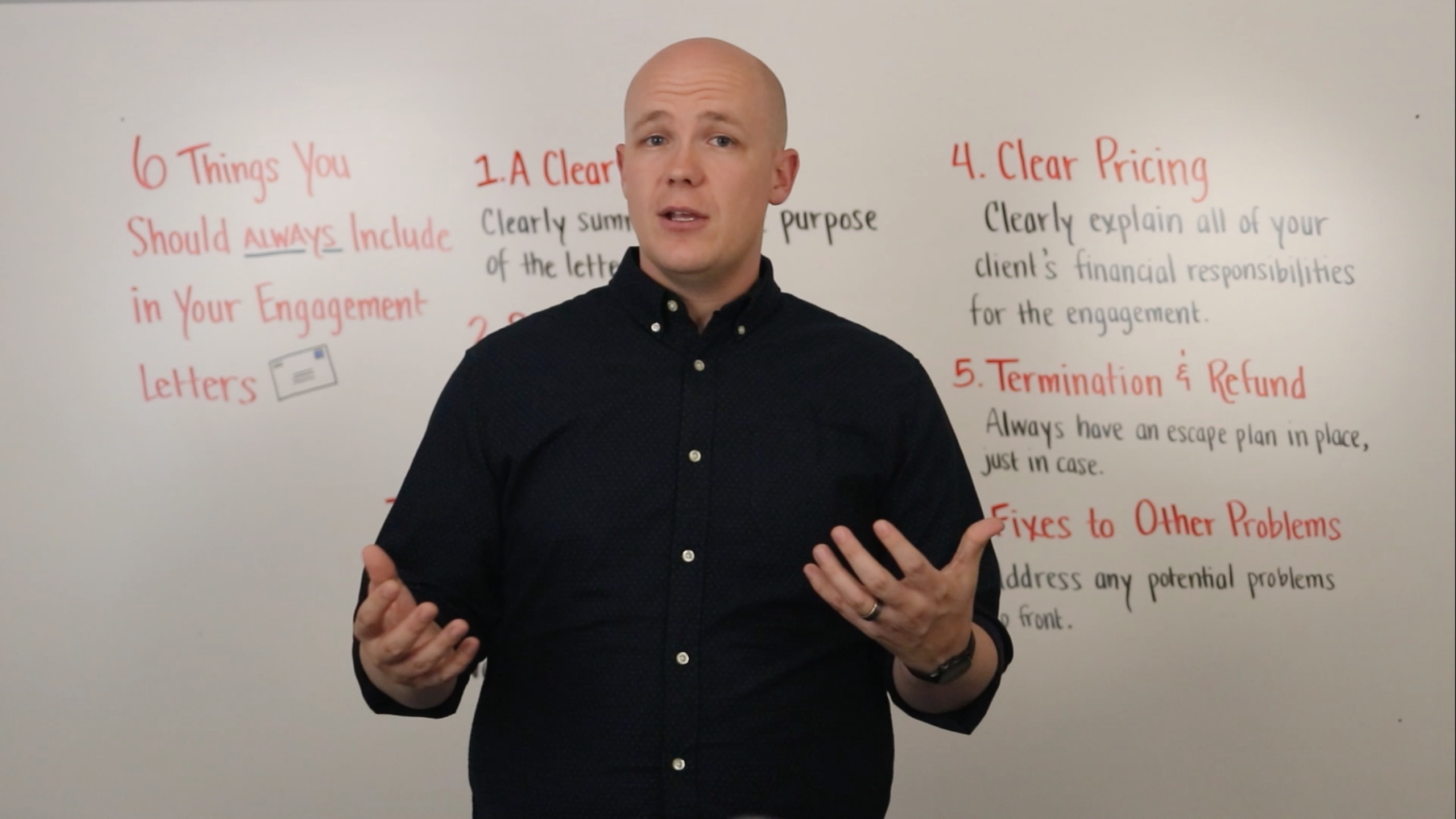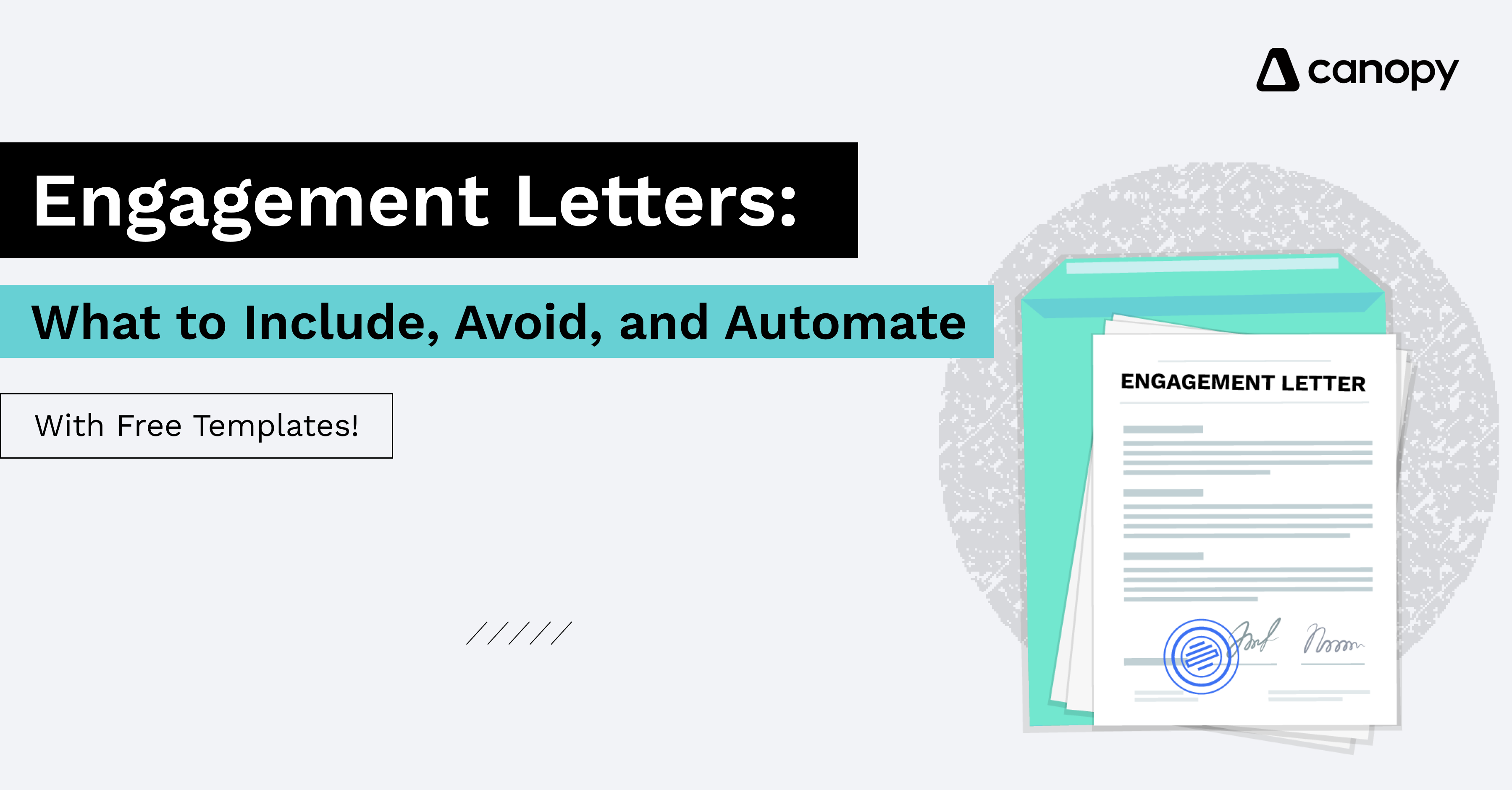What Is an Engagement Letter and Why Accountants Need Them
Engagement letters serve as a binding document between an accountant and their client, outlining the responsibilities and expectations of each party.
An engagement letter is a critical tool in the accounting profession. It serves as a binding document between an accountant and their client, outlining the responsibilities and expectations of each party. But what exactly are they, how are they used, and why are they an important tool for accountants? Let's dive in.
What Is Engagement Letter?
An engagement letter is a formal, written agreement that clearly defines the professional relationship between an accountant and their client. It outlines the scope of work, terms of payment, duration of engagement, and other relevant details.
It’s crucial for accountants to know how to write an engagement letter. Even if they don't write one themselves — leaving it to a law professional — they can still know what to look for in an accounting engagement letter when presented with one.
Learn the dos and don’ts of writing an engagement letter.
Why Do Accountants Need to Use Engagement Letters?
Accounting Engagement Letters are crucial documents designed to kick-off the client’s onboarding process, mitigate risks, avoid misunderstandings, and prevent scope creep. It is not just a good-to-have but an essential component of any accountant-client relationship — it safeguards the rights of both parties, ensuring clarity and transparency.
Mitigate Risk
A CPA engagement letter acts as a legally binding agreement between a client and the accountant meant to mitigate risk for both parties. It clearly outlines the terms and conditions regarding the nature of the relationship, the scope of work, the responsibilities of all parties involved, and any associated costs.
It is advisable for both parties to carefully review the engagement letter and seek legal counsel, if necessary, before signing to ensure clarity and understanding of the terms and conditions. Although it can seem like a formality, engagement letters provide legal protection for both parties in the event of disputes or misunderstandings.
Ensure Clear Communication
Preventing any type of misunderstanding with clients will not only protect your firm legally and financially but will safeguard your firm’s reputation as well. With straightforward communication, clear pricing, and a well-outlined scope of work, your firm can create and maintain its reputation as a trustworthy partner that offers a great client experience.
Engagement letters work to support this goal by outlining exactly the scope of work that is expected, clearly defining costs and payment dates, and acting as a guide to clients as to what is expected of them.
For example, many accountants outline in an engagement letter that clients must provide all legal documents needed to complete specific deadline-oriented tasks, such as a yearly tax return, by a certain date.
Prevent Scope Creep
Relationships change, whether we like it or not. Having a client ask for additional services is a great sign that your firm offers value, but often it’s done verbally and in an ad hoc style that is hard to invoice.
Fortunately, an Engagement Letter can prevent scope creep.
As your responsibility to a given client changes, revisiting the Engagement Letter gives you the ability to point to where the relationship began and how it has evolved. Then you may remove these additional duties or increase the amount you’re invoicing.
Kick-Off the Onboarding Process
The value of an engagement letter cannot be understated, but one benefit that is most often overlooked is that it marks the kickoff of a new relationship.
From the client side — a professional, branded, and thorough accounting engagement letter creates a white-glove client experience and signals to new clients that they’re in good hands from beginning to end. From the internal side, a CPA engagement letter is the trigger for creating and assigning tasks, starting workflows, and getting your firm down to business.
Accounting Engagement Letter Template
Here is a template you can use while creating your own accounting engagement letter.
[Date]
[Client Name]
[Client Address]
Dear [Client Name],
We’re so happy for the opportunity to work with you by providing [specific accounting services]. We’re sending this letter to lay out the terms of our agreement in written word for both of our records.
We will provide the following services:
[Bullet list of services you’ll be providing]
These services will be completed by the end of every [month or quarter (depending on the terms)].
All services will be billed at our standard hourly rates:
[Bullet list of rates depending on the different services]
This arrangement will be in place until either party cancels the agreement through written communication with 30 days [or other designation] notice.
Our responsibility is to complete the previously listed accounting services with care and due diligence regarding company information. We also agree to answer any communication from your firm within [time frame].
Your responsibility includes providing access to your accounting system and providing the documentation and information necessary to complete the accounting services.
In the event of any future disagreements, both parties agree to resolve the issues through mediation. Any cost for mediation services will be split equally between both parties.
Important note: While we stand behind our professional experience, our services are governed by the American Institute of Certified Public Accountants (AICPA) standards.
We look forward to working with you.
Sincerely,
[Your name and business]
[Space for the client to sign here]
(If you want to write your own CPA engagement letter, we have an engagement letter checklist you can follow.)
Engagement Letter FAQ
What happens if the scope of work changes after the engagement letter is signed?
If the scope of work changes significantly, it may be necessary to amend the engagement letter or draft a new one. This ensures that all terms and conditions reflect the current understanding between the accountant and the client.
When do I need to write a letter of disengagement?
There may come a time when you need to end an engagement with a client. Writing a letter of disengagement can be a professional way to handle this transition. Learn the best way to disengage from a client formally and get a Letter of Disengagement template, here.
How often should an engagement letter be updated?
Engagement letters should be updated or renewed regularly, typically on an annual basis or whenever there's a significant change in the scope of work or terms of the agreement.
Are engagement letters legally binding?
Yes, engagement letters are legally binding documents. They formalize the professional relationship between the accountant and the client, and can be used in a court of law if disputes arise.
Is it necessary to include a confidentiality clause in the engagement letter?
Yes, a confidentiality clause is important as it protects sensitive information that the accountant and the client may exchange during the course of their professional relationship. It fosters trust and confidence in the relationship.
Should I use a lawyer to review my engagement letter?
Yes. Engaging a lawyer when drafting an engagement letter is beneficial for a multitude of reasons. A legal professional possesses the necessary expertise to ensure that the content of the letter is in compliance with the prevailing laws and regulations. Lawyers can also guide accountants in delineating the scope of work, roles, and responsibilities clearly, minimizing potential misunderstandings. Furthermore, they can help construct effective confidentiality clauses, dispute resolution procedures, and termination provisions. All in all, a lawyer can help create an engagement letter that is comprehensive, legally sound, and protective of the accountant's interests.
Improve Your Client Experience With Canopy
Numbers are complicated, but managing your accounting firm doesn’t have to be. Focus more on your clients than on your business's everyday operations to improve their experience.
Canopy is an end-to-end platform that lets you organize your documents, workflows, billing, and client management. If you want assistance writing engagement letters, you can get more help from us.

Chris is a content manager for Canopy, joining the team with a combined eight years of experience as a copywriter, editor-in-chief, and content marketer. He's a skilled wordsmith and strategic thinker who shapes brand identity through compelling content and fosters a collaborative and innovative environment. With a passion for storytelling and a dedication to excellence, he is a driving force behind any company's success in content marketing. Champion of the Oxford comma.
READ MORE BY Chris![Why Accountants Need Engagement Letters for Business [Free Template]](https://www.getcanopy.com/hubfs/EngagementLetters_1200x627.jpg)







Get Our Latest Updates and News by Subscribing.
Join our email list for offers, and industry leading articles and content.